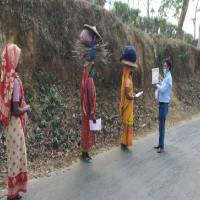
The UNFPA, UNICEF, UN Women, and ILO with overall coordination of UN Resident Coordinator’s Office, are implementing the UN SDG joint program ‘Enhancing social protection for female tea garden workers and their families in Sylhet Division, Bangladesh’ since 2020. The Centre for Injury Prevention and Research Bangladesh (CIPRB) work as the implementing partner of UNFPA. The project coverage 25 teagardens in Sylhet division including 18 teagardens in Moulvibazar district, 4 in Sylhet and 3 in Habiganj district.
CIPRB with the technical support of UNFPA work in 2 outputs under UN-SDG joint project. Output 2 (Capacity for Data and Analysis) Government and Bangladesh Tea Association have increased capacity to monitor the situation of tea garden workers and their families with primary disaggregated data on maternal and child health, education and skills, child protection, occupational safety and health, working conditions, collective agreement and empowerment of women and children. Output 4 (Capacity of Rights-holders to Access Services) Tea garden workers and their families, especially women and children, are empowered with increased awareness and knowledge of human rights and labour standards to access public services including family planning, child and maternal health and nutrition, education and skills training, water, sanitation and hygiene, and child protection services
Showing 1 to 2 of 2 Records
The major challenges identified to implement the joint SDG programme by CIPRB are mentioned below.
1. Mobile phone network is very poor in some teagardens, even out of network in four teagardens. SO very difficult to communication with related stakeholders in those teagardens
2. Local stakeholders especially the garden management and authority are not so cooperative in project implementation. Because, they are not oriented about the project activities. A launching programme with participation of all key stakeholders will helpful to implement the project successfully.
3. Only two teagardens coordinator are responsible to work in 25 teagardens in three districts. So it difficult to supportive supervision of the volunteer routinely. Moreover it needs huge time in travelling to reach all teagardens.
4. Quarterly review or coordination meeting with all partners need to be conducted at district level preferably in Deputy Commissioner’s office
5. Covid-19 is one of the important challenges regarding activities implementation in time. Due to COVID-19 movement in field for the coordinators are challenging due to unavailable of vehicle with double transport cost.
6. Some of the teagardens areas are hard to reach. It is difficult to reach easily and return safely after completing the whole day work by the coordinator.

Showing 1 to 1 of 1 Records